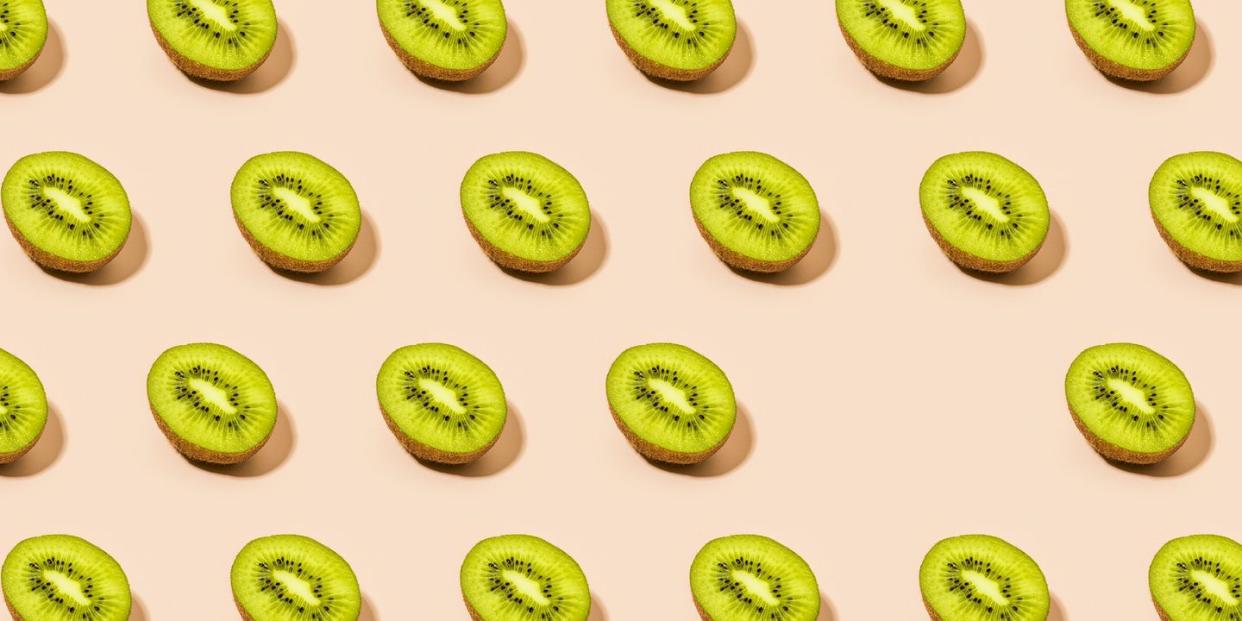8 Powerful Health Benefits of Kiwi You Should Know

Known for its vibrant color and refreshing taste, kiwi is a superfood loved by many. Perfect on yogurt parfaits or in frozen fruit bars, it's a delicious addition to countless recipes. Although this tropical fruit is small, its health benefits are mighty. Here's everything you need to know about kiwis, including nutrition facts and how to eat it.
Kiwi Nutrition Stats
Serving Size: 2 kiwis
Calories: 90
Fat: 1g
Cholesterol: 0mg
Sodium: 0mg
Carbohydrate: 22g
Sugars: 13g
Fiber: 4g
Calcium: 6% DV
Iron: 2% DV
Vitamin C: 230% DV
Vitamin A: 2% DV
Potassium: 13% DV
Different Types of Kiwi Fruit
Kiwi fruit is available fresh, frozen, or dried. Fresh and frozen varieties are typically best, as dried kiwis are often laden with heavy amounts of added sugar. Regardless of variety, check the ingredients list on frozen or dried options to ensure the product is only from the fruit and nothing else.
Although traditional kiwi fruit has green flesh, there are a few different types of equally delicious kiwi fruit varieties available. New York City-based registered dietitian Sammi Haber Brondo, MS, RD, CDN, is a fan of Zespri SunGold Kiwifruit that has a yellow flesh and is sweeter than a green kiwi.

Although all types of kiwis are nutrient-dense, golden kiwi nutrition is pretty impressive. Brondo says that they are known for having the highest vitamin C content of any other commonly eaten fruit (290% DV per serving).
Unlike green kiwis, Brondo says that you can bite into a golden kiwi just as you would an apple. When you eat the golden kiwi skin, you double the fiber content going from 2 to 4 grams per serving.
Kiwi berries are another kiwi fruit variety that has been gaining popularity recently. These little kiwi fruits are about the size of a grape and have a smooth exterior, making them perfect to pop into your mouth for a quick snack just as you would grapes or blueberries. They have a delicious flavor and are sold in clamshells like other berries. This tiny fruit is also rich in Vitamin C and several other nutrients.
Kiwi Health Benefits
May promote healthy skin and hair: Kiwi fruit is an excellent source of Vitamin C, an important antioxidant that can naturally stimulate collagen synthesis. The high vitamin C content in kiwis can help keep your skin firm and youthful-looking and also promote strong strands.
May support immunity: Most people associate oranges with their high vitamin C content, but a serving of kiwi fruit (2 small kiwis) has even more vitamin C than a medium size orange. The body cannot make vitamin C, so it's very important to get enough of this nutrient through food to protect the body from harmful pathogens.
May promote good digestion: Kiwis are a good source of fiber which is important for preventing constipation and keeping the body regular. Green kiwifruit specifically contains a natural digestive enzyme known as actinidin that can break down protein and improve function at both the gastric and intestinal levels.
May support healthy weight loss: This low-calorie yet nutrient-dense snack is packed with filling fiber to help keep you satiated. Kiwis are also over 90% water which can help hydrate the body.
May slow aging and help prevent chronic diseases: As an antioxidant, the abundant vitamin C in kiwi fruit can help to fight free radicals in the body which not only supports healthy aging but can also prevent or even delay the development of chronic diseases like cancer and heart disease.
May benefit moms and babies: During early development, folate is important to help support the healthy growth of a baby's brain and spine. Kiwis, especially the gold variety, are a good source of folate and make a delicious and nutritious snack option.
Note: Kiwis are commonly known to cause allergic reactions, specifically around the mouth, lips, tongue, and throat. If you experience tingling, itchiness, or a prickling sensation in those areas after eating a kiwi, you could be allergic, and should stop eating the fruit immediately and check with your doctor for allergy testing to confirm. Babies should not have kiwi introduced until they are at least 8 months old.
How to Eat Kiwi Fruit
When it comes to enjoying kiwifruit, you'll want to rinse it well and cut it in half. Scoop out the inside with a spoon and enjoy whole or diced. Alternatively, you can carefully peel them with a pairing knife then sliced them. Once you cut the kiwi, make sure not to wait too long to eat it since kiwi fruits contain enzymes that can tenderize the fruit and make it too soft.

Brondo suggests adding kiwi to infused water, tossing it in a smoothie, using it as a salad topping, or mixing slices into yogurt for a perfect pairing of probiotics and prebiotics. Brondo also shares that both green and gold kiwifruit contain a natural enzyme called actinidin that breaks down protein and makes a delicious marinade. She recommends spreading slices or mashing them over meat, chicken, or fish. You can find more of Brondo's favorite kiwi recipes here, including an easy and refreshing summertime popsicle.
You Might Also Like
